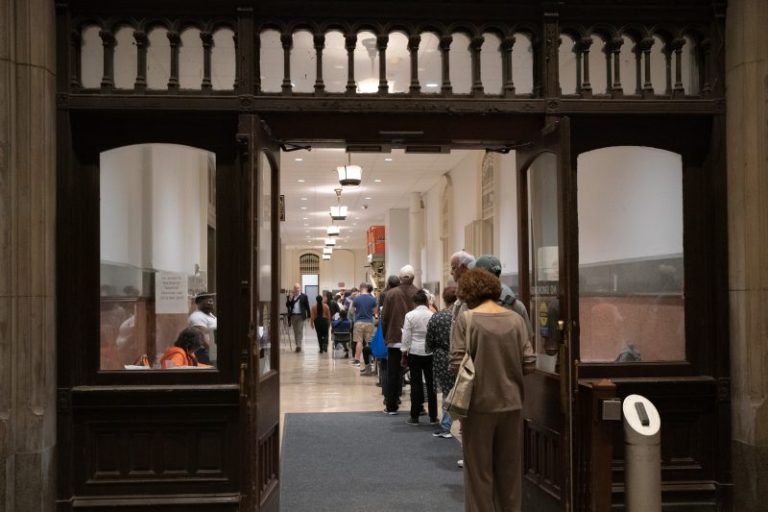Under pressure from a Republican lawsuit, Philadelphia officials decided early Tuesday morning to reinstate a time-consuming process meant to prevent double voting, a move that is expected to delay the city’s ability to report a final tally — perhaps by a matter of days.
The move comes as election officials in Pennsylvania and other swing states warn that results of tight races may not be known on election night. The officials have preemptively pushed back against claims — such as those wielded by President Donald Trump after the 2020 election — that delays are a sign of fraud or nefarious activity.
Philadelphia leaders on Tuesday emphasized that they were only taking the additional step that could slow the process because of Republican litigation.
“I want to make very clear that when there are conversations that occur later this evening about whether or not Philadelphia has counted all of their ballots, that the reasons some ballots will not be counted is because Republican attorneys targeted Philadelphia — and only Philadelphia — in trying to force us to do a procedure that no other county does,” City Commissioner Seth Bluestein, a Republican, said Tuesday at a public meeting of the election board.
The process, known as “poll book reconciliation,” is a way to prevent double voting that Philadelphia implemented in 2020 amid a dramatic expansion of mail ballots in the state. It requires that election workers interrupt ballot counting to scan poll books so that the lists of voters who returned mail ballots can be compared to those who voted in-person. The process generally takes three days, court records show.
Poll book reconciliation is not required by state law, according to court records. And most counties don’t do it. But late last month, the Republican-led organization known as Restoring Integrity and Trust in Elections — which includes strategist Karl Rove as a founder and former attorney general William P. Barr on its board, — backed a lawsuit seeking to force Philadelphia election officials to reinstate the process.
In a statement, the group took credit for persuading the city to change its stance.
“Any duplicate vote undermines the integrity of the system. We know that double voting occurs and that it happens for various reasons, good, bad, ugly, and illegal,” said Derek Lyons, RITE’s President and CEO. “Conducting the audit will protect the integrity of the count. As voters increasingly opt to vote by mail-in ballot, it is more critical to audit the ballots to guard against double voting.”
In a tweet Tuesday, the organization said any delays caused by the poll book reconciliation would be the fault of city officials.
City officials argued that the reconciliation process was labor- and time-intensive and no longer needed given other improved procedures to prevent double-voting and voters’ growing familiarity with mail ballots. In the past three elections, the reconciliation process has found zero double votes, court records show.
City officials also said they wanted to eliminate the process to comply with a new state law that provided funding to improve election administration. Philadelphia received $5.4 million under that law on the condition that ballot counting proceed “without interruption.” City officials said they worried pausing the count to scan poll books could be deemed an interruption, which could put them at risk of losing the grant money.
Democratic groups that intervened in the case said the lawsuit was an effort to “cast doubt on the validity of mail-in ballots and perpetuate the evidence free claim that ‘bad things happen Philadelphia.’”
Get ready to vote with our democracy toolkit
End of carousel
On Monday, Judge Anne Marie Coyle of the state trial court in Philadelphia declined to order city officials to reinstate the process, finding that to do so on the eve of the election would be unduly burdensome. But Coyle issued a scathing 13-page order finding that city officials had “failed to consider the encouragement of fraudulent voting that could reasonably result” from their decision. The Republican plaintiffs immediately appealed.
“While we technically won the court case,” Bluestein said at Tuesday’s meeting, “the opinion was written in a way that we have no other choice but to go forward and reinstate reconciliation.” He and Commissioner Lisa Deeley (D), chairwoman of the election board, voted in favor of reinstating the process; Commissioner Omar Sabir (D) voted against.
Most mail ballots will be counted on Tuesday, according to Deputy City Commissioner Nick Custodio. But before workers can count ballots received in the last day or two before polls close, they will have to spend time scanning in the poll books, as they have done in the last several elections.

